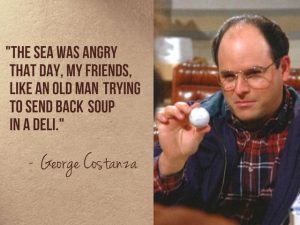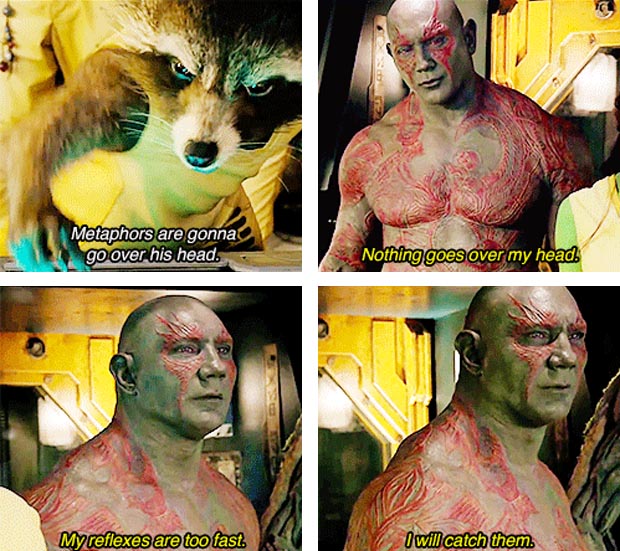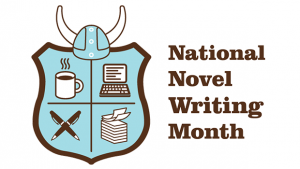True Courage
United they stand
In service of our country,
The home of the brave.
It takes true courage
To fight for the liberty
Of our great nation.
So let’s take the time
To celebrate our heroes
This Veterans Day!
Happy Veterans Day to all the veterans out there! Thank you for your service to our country! Have a blessed weekend!
6 Popular Rhetorical Devices and How to Use Them
Rhetoric: the beautiful art of persuasive speaking and writing that all ambitious people strive to master. It’s a powerful tool for success; within a social and communicative species like ours, so many goals can be achieved simply through the use of effective speech and composition. English is rife with handy rhetorical devices, and while you work on that NaNoWriMo novel, you should consider how to use language to its greatest potential, as much among your characters as with your audience.
So for your reference, here is a list of six popular rhetorical devices, complete with explanations and examples for how to use them. Enjoy!
1) Analogies are as easy as pie.

The sea was angry that day, my friends, like an old man trying to send back soup in a deli. – George Costanza, Seinfeld (Season 5, Episode 14 – The Marine Biologist)
(Image source: Playbuzz)
The analogy is one of the first rhetorical devices we learn to use in school. The basic formula is simple: take two similar ideas and connect them with “as” or “like” (which gives you a simile). They can also be more complex, making use of similes and metaphors to strengthen a comparison in the minds of readers and listeners, thus leaving a lasting impression on the audience.
Analogies are particularly useful for making complex ideas accessible by comparing unfamiliar concepts with familiar ones. Aside from providing simple explanations, they can also be used to create vivid images that engage the audience, such as “autumn leaves falling like golden rain” or “a young lady as beautiful and delicate as a rose”. Try not to use too many analogies at once, though; constantly comparing one image to another will not only get tiresome quickly, but could give the impression of unoriginality, especially if you’re comparing your work to someone else’s. Don’t make your stories as average as the next person’s!
2) Hyperbole is the greatest rhetorical device ever created!
 There’s nothing like exaggeration to get a point across. Who among us hasn’t shared our experiences of “the greatest thing ever”, “the worst day in history”, or “the most fun I’ve ever had in my entire life”? Hyperbole is a common device for creating emphasis, as exaggeration tends to have a great impact on an audience’s perceptions of a given description.
There’s nothing like exaggeration to get a point across. Who among us hasn’t shared our experiences of “the greatest thing ever”, “the worst day in history”, or “the most fun I’ve ever had in my entire life”? Hyperbole is a common device for creating emphasis, as exaggeration tends to have a great impact on an audience’s perceptions of a given description.
If you think about it, it’s funny how we’re inclined to exaggerate so often. After all, nobody literally “dies of embarrassment”, bags don’t literally “weigh a ton”, and friends don’t literally “go forever without seeing each other”. Yet we excuse this lack of literal sense in favor of the bolder imagery that fascinates us so, as if reaching to the limits of our imagination and beyond is simply second nature.
While it shouldn’t be used in excess, hyperbole is a good addition to any conversation that calls for dramatic emphasis. Have your characters use this device to add an informal or amusing tone to your dialogue, while in narrative you can use it to demonstrate intensity or create contrasts with normal descriptions. Use it wisely, and the hyperbole may just help you write the best stories ever!
3) Metaphors are a piece of cake.
All the world’s a stage,
And all the men and women merely players.
– William Shakespeare, As You Like It
Ah, metaphors: the celebrated heroes of poetic language. This is an especially popular device in rhetoric, using figurative speech to make strong comparisons where literal expressions would fall short. A close cousin of the simile and building block of the full analogy, the metaphor is an effective tool for constructing imagery that appeals to the audience’s imagination and draws them further into a story. Why say a soldier is “brave” when you can call him a “lion”, or say that a sound is “sweet” when you can call it “music to one’s ears”?
Metaphors have become so pervasive in modern language that we don’t even realize how heavily we rely on them in everyday speech. We suffer “broken hearts”, laugh “our heads off”, cry “rivers of tears”, and “bottle up” our anger. We’re “early birds” and “night owls”, “open books” and “loose cannons”, “black sheep” and “couch potatoes”, all lost in a “sea of faces” in the great “melting pot” that is our world. Is it even possible to speak completely literally anymore? I can only imagine how hard (and fun) it must have been to write Drax’s lines for Guardians of the Galaxy!

Drax the Destroyer doesn’t get metaphors (Guardians of the Galaxy, 2014)
The metaphor is useful for creating impact in a story, so long as it’s used sparingly and with good timing. If you find your writing is lacking some flair, a well-placed metaphor, whether short and sweet or long and complex, may be just the thing to “brighten up” your story and “paint a colorful picture” in your readers’ minds!
4) Oxymorons are stupidly brilliant!
And faith unfaithful kept him falsely true.
– Idylls of the King (Alfred Tennyson, 1859–1885)

Good night, good night! Parting is such sweet sorrow / That I shall say good night till it be morrow. – Juliet Capulet (Romeo & Juliet, 2.2.185–86)
(Screencap source: Romeo + Juliet, 1996)
This is one of my favorite rhetorical devices, for even though I don’t use it often myself, I enjoy the comical irony of using opposites to create a coherent phrase. The oxymoron is a figure of speech formed by combining contradictory terms, which often leads to humorous results: “jumbo shrimp”, “found missing”, “act naturally”, and so on. Some are even taken for granted as commonplace expressions, such as “virtual reality” and “science fiction”. And what horror fan could forget the classic “living dead”?
The beauty of the oxymoron is that it can just as easily slip by unnoticed as it can make us pause to think when pointed out. In rhetoric, this device can be used to create a paradox and draw attention to a contradiction, such as in Romeo’s criticism of the contrasts of love in Shakespeare’s Romeo & Juliet:
O heavy lightness, serious vanity,
Misshapen chaos of well-seeming forms!
Feather of lead, bright smoke, cold fire, sick health,
Still-waking sleep, that is not what it is!
– Romeo Montague (Romeo & Juliet, 1.1.184–87)
Overall, oxymorons are good for creating dramatic effect in poetry and in prose. They’re also popular as satirical devices, and can make great additions to a piece of humorous writing. So the next time you feel stuck writing comedy, why not try making opposites attract? You may be able to create some “seriously funny” works!
5) I’m not saying paralipsis is an evasive maneuver, but…
 This one was recently featured as a Word of the Week on my blog. It’s common to hear people use such phrases as “I’m not saying”, “not to mention”, and “needless to say”, only to immediately follow them up with a piece of information they just said they wouldn’t talk about. This is known as paralipsis, an ironic way to draw attention to a subject by explicitly stating you won’t mention it.
This one was recently featured as a Word of the Week on my blog. It’s common to hear people use such phrases as “I’m not saying”, “not to mention”, and “needless to say”, only to immediately follow them up with a piece of information they just said they wouldn’t talk about. This is known as paralipsis, an ironic way to draw attention to a subject by explicitly stating you won’t mention it.
A relatively colloquial device, paralipsis is used most effectively in speech rather than in writing, making it a good choice for character dialogue. One of the most notable examples in literature (as pointed out by Mike of M.C. Tuggle, Writer) is Mark Antony’s speech in Shakespeare’s Julius Caesar, in which Antony brilliantly uses this device to turn the crowd against Brutus and the other conspirators:
Have patience, gentle friends, I must not read it;
It is not meet you know how Caesar loved you.
You are not wood, you are not stones, but men;
And, being men, bearing the will of Caesar,
It will inflame you, it will make you mad.
‘Tis good you know not that you are his heirs;
For if you should, O, what would come of it!
– Mark Antony (Julius Caesar, 3.2.139–45)
In rhetoric, paralipsis has several uses: to indirectly point something out, to make a passive-aggressive comment, to criticize someone without being held accountable, or to explain something while politely avoiding a suggestion of ignorance (or, alternatively, to make a sarcastic comment about the audience’s ignorance). Though it should be used carefully, this is a highly effective device that can make for some exceptionally persuasive speech. I’m not saying it’ll help you reach or even surpass the level of your favorite authors, but learning to use paralipsis well will definitely improve your proficiency as a writer!
6) I love when people take sarcasm seriously.
Irony in its sharpest form, sarcasm is hailed as one of the most beloved tools in the comedic arsenal – so much so, that it’s become nearly impossible not to hear it in some form or other in everyday speech. Sarcasm is basically the use of wit to make a point, typically in a bitter way that conveys contempt. This device comes in many flavors, including deadpan, self-deprecating, manic, and even polite. It’s used to amusingly draw attention to the obvious, to mock oneself or others, or simply as a coping mechanism to make the frustrations of life a little more bearable. I know I’ve had those days that I couldn’t survive without a little sarcasm to tide me over!

Leonard has to clue Sheldon in on Penny’s sarcasm (The Big Bang Theory: Season 1, Episode 2 – The Big Bran Hypothesis)
(Image source: Tumblr)
Given its acidic nature, sarcasm is best exercised with caution. Like most humor techniques, it’s hard to teach because each person uses it differently and even harder to master because not everyone understands it, but sarcasm in particular is worth the effort as it’s a strong indicator of the writer and the readers’ intelligence. Use it in dialogue to demonstrate a character’s sharp wit or occasionally in narrative to indirectly criticize people and society, and if you must use it to address your readers, at least try not to be too offensive and alienate an audience who have no sense of humor. Or, you know, just do whatever you want. Why give a damn what the rest of the world thinks?
What are your thoughts on these rhetorical devices? Any other favorites you would add to this list?
Word of the Week: Detente
Word: detente
Pronunciation: day-TAHNT
Part of Speech: noun
Definition: the easing of hostility or strained relations, especially between countries
Source: Oxford Dictionaries
It’s been a great month for French and political vocabulary words, hasn’t it? Unless you’ve been living in a cave for the past several months, you know that tomorrow is the day that one of the most highly contentious American presidential races in history finally draws to a close. Regardless of which candidate you support (or even if you never cared), I’m sure there’s one thing we can all agree on: it’ll be nice when the tension from this election season finally dissipates! Granted, that likely won’t happen until well after Election Day, but we can still dream of some sort of near-future “detente”, right?
“Detente” (also spelled “détente”) refers to the easing of strained relations or hostility, especially between nations. The word arose in English in the early 20th century and is originally a French noun, literally meaning “loosening” or “relaxation”. This noun stems from the Latin verb detendere, which means “to loosen” or “to relax”.
Naturally, the word “detente” first came to my attention recently while reading yet another political article, in this case about the annual Alfred E. Smith Memorial Foundation Dinner that takes place in New York on the third Thursday of October and which U.S. presidential candidates have traditionally attended since 1960. Being a typical stop for the candidates during “debate season”, it makes sense that this event, treated as a roast, would serve as an outlet for easing some of the tension in the race. Note that “detente” is normally used in a political context, though I suppose it could be used in any reference to an alleviation of strained relationships. If you write political fiction heavy with tension between nations or parties, it may be worth throwing the occasional “detente” into your stories!
What are your thoughts on this word? Any suggestions for future “Word of the Week” featured words?
The Monster Under The Porch (Part 2)
Welcome to the conclusion of “The Monster Under The Porch”. If you haven’t yet, read Part 1 here. Otherwise, enjoy!
Autumn watched anxiously as her mother walked around the porch, peeking under the boards on her way to the far end by the side of the house. Try as she might, the child couldn’t stop imagining what sort of monster might be lurking under their house. Was it a troll? A gremlin? Or what if, with those bright eyes – she shuddered – it was a wolf? The girl shut her eyes tight to keep from crying, but after a minute, she looked up again at the sound of a woman’s voice exclaiming.
“Autumn, come quick!”
Suddenly curious, Autumn hurried to the edge of the porch and looked down over the railing. To her astonishment, she saw her mother kneeling on the ground and smiling up at her. Next to her, a black kitten was sniffing at a few pieces of candy that had rolled off the porch.
“He must have gotten lost and wandered under our house,” she said, stroking the cat as he pawed at the candy. “I think you scared him more than he scared you!”
Autumn grinned as the kitten looked up at her, no longer afraid of his bright yellow eyes. Just then, a group of costumed children appeared in front of the house, heading up the walk toward the front steps. The girl’s mother gently scooped up the cat and rose to her feet.
“Sweetie, can you keep an eye on this little guy while I hand out the candy?” she said as she returned to the door. Autumn eagerly agreed, taking the animal in her arms so her mother could distribute the sweets. The cat was surprisingly calm around her, considering the fright she had given him a few minutes ago.
“Can I please keep him, Mommy?” the girl asked after the other children had left with their candy.
“He might belong to someone,” said her mom, taking a broom by the door to sweep up the mess of confectionery left on the porch. “We’ll wait until Daddy gets home, then he can hand out the candy while you and I go door to door looking for the cat’s owner.”
“And if no one claims him?” said Autumn, her eyes bright with hope.
“Then Daddy and I will talk about it.” And that was the end of the discussion.
For the next hour, Autumn played with the kitten on the porch while her mother sat beside her with the bowl of candy, handing out sweets to every trick-or-treater who stopped by. When her father came home, the girl set off with her mom in search of the cat’s owner, but after knocking on every door on their street and on the neighboring streets, they hadn’t found one person who had ever seen the kitten before, and mother and daughter returned home with the stray animal still purring softly in the child’s arms.
Autumn sat on the living room floor stroking the sleeping kitten in her lap while her parents talked in the kitchen. By the time they returned, her heart was pounding. She was ready to cry and beg to keep the little cat to which she had grown so attached in the last few hours, but to her immense relief, she noticed when they asked her to join them at the table that they were both smiling.
At ten o’clock that night, Fred returned from his friends’ party to find his family seated around the living room waiting for him. He was about to ask what was going on when he caught sight of a small mass of black fur on the carpet, staring up at him with round yellow eyes. When he took a step toward it, the animal hissed and scurried off to jump into his sister’s lap. Stunned, the boy looked up to see his parents laughing from the couch.
“Welcome back, Fred,” said his mother. “I see you’ve met the newest addition to the family.”
“Don’t worry, I’m sure he’ll warm up to you soon,” said his father, though his smile suggested he looked forward to seeing their new pet put his rambunctious son in his place.
“Yeah,” Fred muttered, realizing that a lot had happened since he deserted his sister on the street. “So, um… what’s his name?”
Autumn, still in her costume, smiled from the armchair across the room, stroking the black cat affectionately as they both eyed her brother like a real witch and her loyal companion would a frightened child.
“Monster.”
The End
Hope you enjoyed the story! Thanks for reading!
10 More Inspirational Writing Quotes for NaNoWriMo
Welcome to November! National Novel Writing Month is upon us again, a whole 30 days for writers to put their excuses aside, scrape together all those loose ideas, and finally write that 50,000-word novel! It’s certainly an intimidating task to say the least, but a little motivation can go a long way in helping you get started. Last year, I shared some helpful writing tips in the form of 10 inspirational quotes from famous authors, so this year I’m sharing some more quotes, this time about the creative process and what it means to be a writer.
So on that note, here are 10 more inspirational writing quotes for novel-writing motivation. Enjoy, and good luck in this year’s NaNoWriMo!
1) The scariest moment is always just before you start. – Stephen King, On Writing: A Memoir of the Craft
2) And by the way, everything in life is writable about if you have the outgoing guts to do it, and the imagination to improvise. The worst enemy to creativity is self-doubt. – Sylvia Plath, The Unabridged Journals of Sylvia Plath
3) Tomorrow may be hell, but today was a good writing day, and on the good writing days nothing else matters. – Neil Gaiman
4) There is no greater agony than bearing an untold story inside you. – Maya Angelou, I Know Why the Caged Bird Sings
5) You must write every single day of your life… You must lurk in libraries and climb the stacks like ladders to sniff books like perfumes and wear books like hats upon your crazy heads… may you be in love every day for the next 20,000 days. And out of that love, remake a world. – Ray Bradbury
6) Those who find ugly meanings in beautiful things are corrupt without being charming. This is a fault. Those who find beautiful meanings in beautiful things are the cultivated. For these there is hope. They are the elect to whom beautiful things mean only Beauty. There is no such thing as a moral or an immoral book. Books are well written, or badly written. That is all. – Oscar Wilde, The Picture of Dorian Gray
7) I can shake off everything as I write; my sorrows disappear, my courage is reborn. – Anne Frank
8) Lock up your libraries if you like; but there is no gate, no lock, no bolt that you can set upon the freedom of my mind. – Virginia Woolf, A Room of One’s Own
9) The first draft is just you telling yourself the story. – Terry Pratchett
10) Start writing, no matter what. The water does not flow until the faucet is turned on. – Louis L’Amour
What are your thoughts on these writing quotes? Any others you’d add to the inspirational list for NaNoWriMo?



Recent Comments